A bike trip to Massawa, Eritrea and the Red Sea
My first trip to Massawa was on a bike
by John Coyne (Ethiopia 1962–1964)
In January of 1963, my group of PCVs to the Empire, some 280 + of us, assembled for a conference in Asmara.
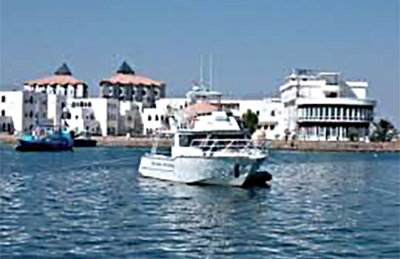
Massawa on the Red Sea
On the Friday between workshops, four of us: Tim Bodman, Charlie Michener, Ernie Fox, and myself — all Ethie Ones — decided to rent bikes for the 70-mile trip from Asmara down the mountains, across the Danakil Desert, and to the shores of the Red Sea. None of us was stationed in Eritrea, so did we know the way to Massawa. We just knew it was downhill from Asmara, at an elevation of 7,628 ft., to the sea.
Starting before sunrise we pedaled five miles to the edge of the mountains. At that level, we were above the billows of white and gray clouds that lay perfectly still, enclosed the valleys below and encased the rugged mountains peaks. The red sun coming up out of them looking like a sore thumb.
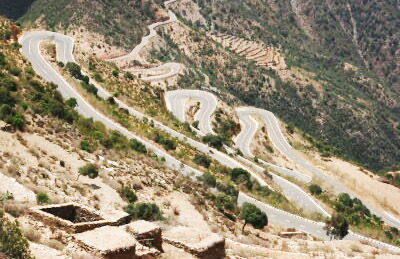 It was cold when we pushed off down the mountain, and for a while we were bothered with the wind that froze our fingers to the hand brakes, but soon we were too busy and excited to worry about the cold, and all our concentration was centered on the zig-zag blacktop road ahead. We descend single file on the edge of the mountain through hairpin and corkscrew curls. We bent into the turns from the outside edges of the road, cut the corners, and then leaned to the opposite side and maneuvered the next curve.
It was cold when we pushed off down the mountain, and for a while we were bothered with the wind that froze our fingers to the hand brakes, but soon we were too busy and excited to worry about the cold, and all our concentration was centered on the zig-zag blacktop road ahead. We descend single file on the edge of the mountain through hairpin and corkscrew curls. We bent into the turns from the outside edges of the road, cut the corners, and then leaned to the opposite side and maneuvered the next curve.
All the while people, dogs, and livestock filled the road. And then Tim, smashed into a man who had stepped into his path to cross the road. We stopped to make sure he was okay, and Tim, while hurt from his fall, said he was going on with us. Charlie dropped back to ride beside him as we continued as a pack going down to the sea.
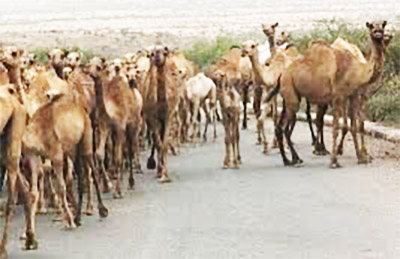
Danakil Desert
Out of the cold morning of Asmara we rode, into the wet clouds, through the villages of Embatkala and Ghinda, past the ancient monastery of Bizon, and onto the tropical climate of the desert where we stopped to eat a breakfast of wine, cheese, and bread, and to watch a camel caravan move idly across the baked flatlands carrying bundles of wood and skins.
In two hours we had covered sixty-nine kilometers.
I remember spotting an elderly European man in a shop along the way who was obviously the owner. He was sitting back in the corner of the roadside restaurant that was no more than a shed, while several Eritrean women did the cooking. It was obvious — as he was giving orders to the women in Italian — that he had stayed in the Empire after the war and started this drive-in, here in the depths of the Danakil. He wasn’t, of course, the only World War II veteran we saw in our rural villages and towns during those early years of the Peace Corps in Ethiopia.
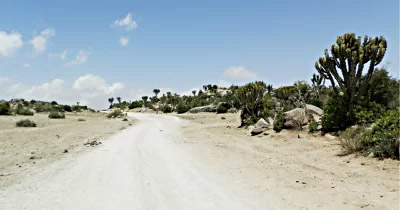 Pushing on across the desert, after having dropped out of the hills, the four of us found that it was no longer all downhill. The highway, while mostly paved and not heavy with traffic, did rise slightly as we headed to the Red Sea, and this demanded that we pedal our way, and not glide along.
Pushing on across the desert, after having dropped out of the hills, the four of us found that it was no longer all downhill. The highway, while mostly paved and not heavy with traffic, did rise slightly as we headed to the Red Sea, and this demanded that we pedal our way, and not glide along.
It was on this stretch of two-lane highway that a bus full of PCVs came down out of Asmara and passed us. They too were headed for Massawa and a day of sunshine and rest by the sea.
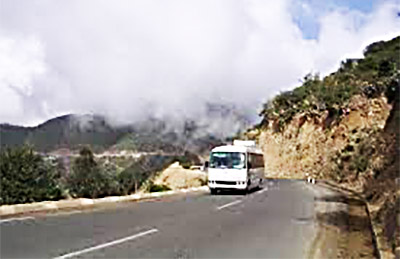 The driver, spotting the four of us, slowed down, perhaps being told by the Volunteers to pull over. There we were!
The driver, spotting the four of us, slowed down, perhaps being told by the Volunteers to pull over. There we were!
A few asked us if we wanted a ride, and the girls (of course) offered us food and water, or anything else they could give us to help us on our trip. We kept smiling and declined the offers of a ride — there was no way we would give up on the bike ride and the challenge to making it to the Red Sea.
Waving goodbye, we followed slowly after them as the bus quickly disappeared in the distance.
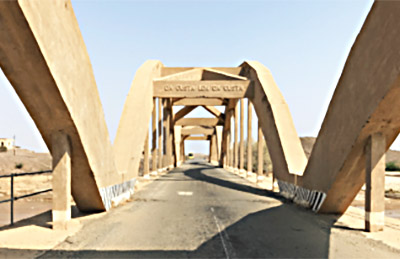 It would take us almost two more hours to cross the width of the desert, but we did it — first joining together to ride into town —as we reached the bridge and rode across it into Massawa.
It would take us almost two more hours to cross the width of the desert, but we did it — first joining together to ride into town —as we reached the bridge and rode across it into Massawa.
It’s fun to read about the trip to Massawa. I went several times between 1962 and 1964, but always by littorina, never by bike.
All I can say is Amazing! That so much of the world, including the Horn of Africa, is presently off limits makes this travel historic.
As one of “the girls” on the bus this was indeed a trip back in time. The boys on bikes did a remarkable thing pedaling on that road. Needless to say i assume they rode the bus on the trip back!
I remember the beach and water were such s welcome sight and respite.
Think of the history made on and around the Red Sea! My own grandparents traveled on it with two little boys in early 1900s on their way to kenya to live and serve as Quaker missionaries for over 30 years.
Thanks for great story!
We also went to Massawa by the litttorina. A wonderful trip–remember the muezzin calling people to prayer from a tower and eating seafood.
I guess I’m old enough to admit to one particular fixation I had on my trip on the Littorina from Asmara to Massawa. I remember boarding alone, sitting across from some Muslim women who only revealed their eyes. One, a girl of about eighteen, kept her eyes fixed on mine from the moment I sat down. Being twenty-one, I could not help but return her gaze. I doubted that she had ever met a white American, although there were thousands of Italians and American soldiers living in Asmara. After musing about the differences in our races and cultures, I dove deeper into my emotions. What beautiful eyes! Was she trying to say something to me, to send me a message that transcended our dialects, or spoke a universal tongue? She did not stop looking at me, nor did I look away from her, from Nefasit, to Embatkala, to Dongollo, to Gahtelay……down, down into the heated Red Sea atmosphere. The moments flickered away then melted into a single, sustained gasp of….. Even then, I knew it was not love, but just infatuation; that true love costs time, commitment, and mental energy. Then suddenly, our reverie ended. The railcar stopped, we broke our fragile union, and the young woman stepped off the train at Adiberai. Yes, I admit that this was not the heroic bicycle ride related by my Ethi I partners John, Tim, Charlie, and Ernie, but I will wager that my trip to Massawa was at least as vivid and memorable.
What made my trip to Massawa memorable was the elderly man sitting in front of me on the ancient, crowded bus I took back to Asmara. After the slow crawl up the escarpment, the old man began calling for the driver to stop for a potty break, but the driver ignored him. The bus had the drop-down style windows such as school buses have, and they were all open. I was sitting next to my window, and in the seat directly ahead of me, the old man sat next to his window, also.
Rather than slowing for a rest break, the driver was speeding up, and the old man took matters into his own hands. Standing awkwardly in his seat, he bent hips to window. Too late, I realized what he was about to do. As I grabbed for my window to slide it up, he shot a stream of urine out the bus, and the slip-stream created by the accelerating vehicle carried his piss back through my still-open window. I ducked, but way too late. I took off my shirt, wiped my face, and tossed the shirt out onto the road.
Being elderly myself now, with a swollen prostate, I so much better understand that passenger’s urgency, and what compelled him to take action. I even forgive the old guy and chuckle a bit. But the memory remains vivid – very, very vivid.